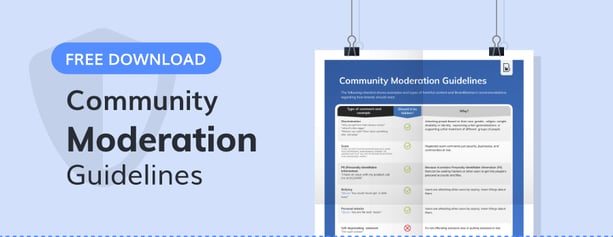
Social Media Moderation: Why It’s Essential and How To Do It
As the famous internet expression goes: "Haters gonna hate." So as a business, why should you be concerned about what only a handful of people are saying about your brand?
Social media is inherently public. It's not just your personal channel or your personal account being attacked in the worst cases, questioned in the best cases. When a brand expresses itself on social media, it's doing more than simply posting and managing online content. On social media, brands engage their true fans, inform prospecting customers, and build online communities.
Social accounts act as your brand's representatives. When your posts and comments get attacked online by so-called "haters," it's not just your work that is under attack; it's your brand, your fans, and your existing and future customers. That's why you, as a content manager, need to make sure that the brand image you are broadcasting on the world wide web is consistent with your brand's DNA- its personality, its tone, its roots, and its values.
Table of Contents
What is social media moderation?
Why is social media moderation crucial to your brand's success?
- Customers depend on social media for information
- Comments on your brand’s social media influence buying decisions
- Brand awareness is expanded on social media (for better or for worse)
- You could be losing sales to competitors and unauthorized selling
- Your brand is associated with what it’s surrounded by
- Your community could be in danger (spam, scams, and PII)
- You may be unaware of urgent issues
What is social media moderation?
Social media moderation refers to the review and management of activities performed on a social media platform. User-generated content (UGC) on a brand's social media accounts may require actions, whether by responding, reporting, or removing. This maintains a healthy and positive community.
Social media moderation can be seen as the executing part of social media monitoring and social media listening. If you are interested in how to specifically moderate content on Facebook, we have an entire article dedicated to the topic. Taking action can manifest in different ways depending on the platform. Read more on the negative side effects associated with deleting comments on Facebook in this article.
Why is social media moderation important to your brand’s success?
1. Customers depend on social media for information
Studies have shown that over 70% of customers have visited social media sites to get information. This percentage is made up of customers across the buyer journey, including new customers, customers in the consideration phase, returning customers, and loyal customers. Therefore, your brand must ensure it caters to its entire audience on social media by providing valuable information and by looking out for misinformation, such as false referral codes on user comments.
Consumers will inevitably revert to your brand's social accounts' comments section to see what people are saying about your brand. It's important to moderate what is being said in your social setting, as it's the information your followers will absorb. Incorrect or misleading information provided by users on your account misrepresents your brand and could put your users in danger. Brands should monitor and respond to all inquiries that could potentially be sensitive and harmful on social media. Click here to read about a large beauty brand that partnered with BrandBastion to address customers’ claims that were harming the brand’s reputation and negatively affecting ad performance.
Moderation is imperative, but engagement is too. Click here for a guide on how to properly respond to customers on social media.
2. Comments on your brand’s social media influence buying decisions
Close to 50% of customers have made a purchasing decision based on what they found on a brand’s social media account. Since the pandemic, people have been scrolling and buying online more than ever before. Consumers revert to social media no longer on a daily basis, but on an hourly basis. This allows them to find your brand and to dig deeper into your brand’s social media presence. They can discover how sustainable your brand is, how the community is treated, or how the community treats your brand.
Content may be king, but moderation is mandatory. Consumers come back time and time again to your social accounts before making a decision, and they have the time and opportunity to scroll through your content as much as your comments. A negative comment about your service that does not get a response could deter that customer. A series of trolls leaving hateful and derogatory comments on your social media accounts could lead consumers to believe you, too, support the discussions being had on your brand’s social accounts. Click here to discover just how much social media impacts sales.
3. Brand awareness is expanded on social media (for better or for worse)
60% of customers have said they are likely to pass on information about your product or service on social media, and 71% said they are more likely to purchase products and services based on social media referrals.
These stats emphasize how important it is that you deliver an excellent customer experience. The better the experience is on social media, the more likely your brand will get a referral. However, consumers are equally, if not more likely, to talk about negative experiences with friends, family, and even the general public!
Negative information is 63% more likely to be clicked on than positive information. Brand awareness can expand online, but it’s also where brand reputation can be squashed.
4. You could be losing sales to competitors and unauthorized selling
You might unknowingly be falling victim to unauthorized selling or losing sales to competitors due to comments on your social accounts. Maybe you’re aware of it, but your brand gets high volumes of comments and finds it difficult to track manually.
Well-recognized brands are constantly being bombarded with people seeking to mirror their websites, steal intellectual property, offer products at a discounted price, or engage in counterfeit selling through the comments section on their social media accounts. This puts brands’ reputations and revenue at serious risk, not to mention the health risks involved for the consumers that purchase counterfeit products.
5. Your brand is associated with what it’s surrounded by
As a kid, were you ever told that you are who you surround yourself with? It can be frustrating because you might feel different than those around you - you might act or think differently, but the mere fact of being around them makes you like them. As much as you fight it, you become associated with the people you surround yourself with.
The same goes for brands. When brands permit hate speech and discriminatory social media comments, they become associated with it. A brand could entirely disagree with the message, the verbiage, and the vernacular, but all of the content on a brand’s page becomes intertwined into who they are.
Brands need to moderate comments so that they are not associated with, for example, hate speech or discriminatory speech. Racist comments that target individuals on your brand's social pages create a dangerous space for unproductive conversations and attacks. By acting as a bystander, your brand could be putting its social community and reputation in danger.
6. Your community could be in danger (spam, scams, and PII)
Hate speech and discrimination aren’t the only things that put your social media community in danger. Brands need to be moderating social media for spam, scams, and personally identifiable information. Comment sections are a great way to access vulnerable people looking for deals, discounts, or promotions. Permitting comments that ask for a user's personal information puts both adults and minors in a brand's community in danger.
Scam comments have the potential to take over your social account. They are irrelevant and take away from real interactions and questions on your brand’s social media accounts.
Cut the cycle short by using social media moderation tools to ensure that the content surrounding your ads is safe.7. You may be unaware of urgent issues
It's easy for mistakes in ad creatives to go unnoticed, but doesn't your company want to ensure every ad campaign accomplishes its objectives? Whether your campaign's goal is to spread awareness, bring traffic to your website, or generate leads, moderation tools are your friend.
Customers are quick to point out broken links or misspelled words; therefore, by investing in moderation tools that pick up on these issues, your brand can quickly be made aware of broken links, typos, and spikes in negative sentiment.
Social media moderation solutions
Brandbastion’s solutions offer a way to easily moderate your corporate communications offer a way to moderate your corporate communications across social media easily.
BrandBastion's Safety solution allows you to drive better performance when advertising on social media by providing an excellent customer experience, protecting ad spend, and reacting swiftly to shifts in sentiment. Our solution allows your brand to customize your guidelines, selecting from a wide range of categories, such as threats, discrimination and hate speech, sensitive brand topics, profanity, spam, and many more.
- 100% Fully Managed Serviced: Your in-house team won't have to monitor comments and take action. We act on your behalf.
- 24/7 Real-time Coverage & Human Team: Working alongside our tech are highly trained content processing specialists to ensure accuracy on all actions taken.
- Full coverage across paid and organic: in up to 43 languages, with no limits on scaling up social media profiles or comment volumes.
- Specialized account management: You are assigned a designated account manager working as an extension of your teams to provide highly tailored service.

